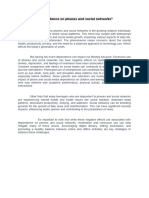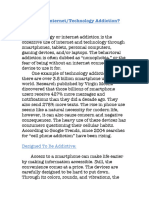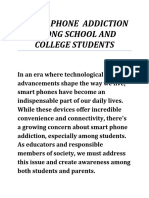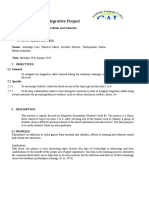0% found this document useful (0 votes)
6 views1 pagePhone Addiction
Phone addiction, characterized by excessive smartphone use, negatively impacts various aspects of life, including health, relationships, and productivity. It can lead to physical issues like eye strain and mental health problems such as anxiety and depression. To combat this addiction, individuals can implement strategies like setting screen-time limits and prioritizing real-life interactions over virtual ones.
Uploaded by
scribdCopyright
© © All Rights Reserved
We take content rights seriously. If you suspect this is your content, claim it here.
Available Formats
Download as PDF, TXT or read online on Scribd
0% found this document useful (0 votes)
6 views1 pagePhone Addiction
Phone addiction, characterized by excessive smartphone use, negatively impacts various aspects of life, including health, relationships, and productivity. It can lead to physical issues like eye strain and mental health problems such as anxiety and depression. To combat this addiction, individuals can implement strategies like setting screen-time limits and prioritizing real-life interactions over virtual ones.
Uploaded by
scribdCopyright
© © All Rights Reserved
We take content rights seriously. If you suspect this is your content, claim it here.
Available Formats
Download as PDF, TXT or read online on Scribd
/ 1
























































